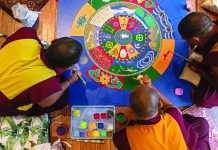Expanding Our Self-Definitions

As Americans, we highly value our independence. We often take our rights for granted. We expect, assert, and demand. We stand up and we speak out. The American dream of life, liberty and the pursuit of happiness is legend around the world and our lifestyle is attractive to some and repulsive to others because of our independent stance.
In delivering weekend leadership seminars to large groups, I started noticing an interesting phenomenon. As we moved more deeply into the experience, groups as a whole often display two distinct attitudes. A large percentage of the participants will ignite, become actively enthusiastic, alert, participatory and clearly on the ride. From a presenter’s point of view, this would be the time to start congratulating oneself on a job well done and then pump up the volume to get the rest of the troops on board. Instead, I started to get curious about the quieter ones. I noticed a pulling back, a reticence and hesitancy that wasn’t as easily discernable because of the rapid-fire participation of the outwardly expressive people.
The benefit of presenting seminars for as many years as I have is the opportunity to discover and explore the not so obvious aspects of group dynamics. I started noticing that there is a critical time when the new learning experience starts taking hold and beginning its transformational magic. At that time, the extraverted, outgoing personalities get more outgoing. At the same time, the introverted, introspective people get more internal, recede into themselves and start deeply probing into their fears and apprehensions, asking new questions that begin to highlight dormant parts of their self-awareness.
The extraverts display their excitement about knowing the answers so that they can climb the heights and reach for the stars, while the more introverted plumb the depths into new internal territory to deepen their self-understanding. Extroverts would be better served by letting go of collecting answers in favor of asking themselves deeper questions. Introverts would fare better if they let go of self-questioning in favor of owning and valuing those answers they have already discovered as workable for them.
Usually, the extroverts get recognized and encouraged to continue their turned-on, enthusiastic climb towards more, bigger and better. The introverts get advised to get over their reluctance and simply dive headfirst into the exuberant end of the pool. Therefore, they often quietly make themselves wrong, commit to goals they don’t really care about and try to hide the sinking, depressed feeling that envelopes them when subjected to the ranting of manic, supercharged, I want it all and I want it now energy.
Our society values extroversion, action, positivity, influencing the thoughts of others and independence. We hold introversion, hesitation to express opinions, contentment with our present moment and dependence as suspect and problematic experiences to be altered and fixed. When independent is held as good and dependence as bad, we are forced to lie to ourselves about the fact that we are all both dependent and independent. When we value our extraverted behaviors and devalue introversion, we are unable to access the skill of introspection and therefore can never grow into our true wisdom and self-knowledge.
Those of us, who define ourselves as independent, simply have a case of “selective perception.” We conveniently minimize or take for granted all the people and situations that support and sustain us in our pursuit of happiness. Those of us who define ourselves as dependent are deluded also. We fail to lay claim to our strengths, unique gifts and contributions, often because of the denigrating habit of self-invalidation and defining our worth in terms of external provable outcomes.
When we broaden our perspective to acknowledge that we are both independent and dependent, we can begin to cultivate interdependent relationships with ourselves and others. When we embrace both masculine and feminine, active and receptive, power and service, and introspection and extroversion within ourselves, we can then take on the intriguing task of establishing mutually beneficial empathetic relationships with others also.
We can create inner peace personally by broadening our self-definition. By expanding our nationalism to a world vision, we can encourage peace by elevating our respect for all people, in all countries inhabiting our globe.
Susan is the author of “Beyond Intellect: Journey Into the Wisdom of Your Intuitive Mind.” Reach her at: susanvelasquez.com.




